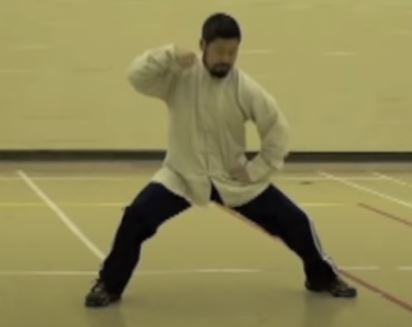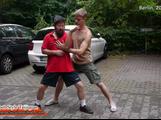During a discussion on the English speaking Wechat group for PM a very interesting question was pointed out by Pawel Muller from Vienna.
As set by Ping Wei from Phoenix on the chat, the question was noted as what comes to the mind of a PM student, when Master Chen speaks about power.
Alexandra Hasenfratz from BC Canada answered that it’s the ability to move or take down someone or something.
Paul Carlson from Fort Collins as well as Rainer Kummerfeldt from Luebeck, added the concept of power in physics.
So, according to Wikipedia, “In physics, power is the rate of doing work, the amount of energy transferred per unit time.” It is not force but in a way related to force. One formula for power is Power = force x velocity. This connects to what Master Chen means when he says “power”. It is not force. When he says “power” it is always connected with a motion of some kind and seems to also relate to time”.
Then Pawel further explained the context of the question, on what the students think of, simply put what are the images in their head, when they hear the word “power”:
“What comes to your mind? There is no right or wrong. It’s not a test! It has nothing to do with Taijiquan even.
I would just like to know what native speakers think when they hear Master Chen using the word power, and not only for native English speakers. In other words: how do you interpret power.”
Damian Jagosz from Poland added on the discussion that power is the true ability to interfere, as Master Chen often gives with the example of door hinges:
“I always watched the door as I watched and only imagined the strength between the hinges until I had a smaller version of the door in my hands as in the attached movie.
Then I felt the strength moving the main wing of the card, I understood that I really release it and do not generate it.
I also understood that moving the whole object doesn’t matter because the hinge and the point of contact with the wood do not move”.
Bhargav Khaund from Mumbai then explained about power in the context of Taiji:
“I initially equated power to sheer physical strength. Gradually I realized Taiji power is something that comes out of a stable, not moving structure. Thus every time MC mentions the word power I look for the underlying structure that provides such power. As long as we maintain structure be it in the form or during push hands we have power. But the moment the structure disintegrates (which by the way happens to me often) I fall back on my physical strength and that’s when I start powering up and end up doing non-Taiji moves. To me, “to have power” and “to power-up” are two different things. I used to be confused – sometimes I hear “maintain power at all times”…. sometimes “get rid of that power” until Master Chen taught me this gem of a concept – “it’s not how you power-up, it’s how you separate”.
As I was reaching my phone and read the interesting conversation, I added that:
“Power is alignment. Regarding while in contact with the opponent, power is directed on the ground through adjustment and then power is redirected to the opponent. In this way, power is vertical and not horizontal. Master Chen as a teacher is the best way of receiving this experience, according to the PM system principles”.
Pawel as chat administrator set that the last is too abstract and too refined.
“Not that it’s wrong what you’re saying, I don’t know whether it’s right or wrong.
That’s a Rohrschach ink image.
My question goes into the direction of prompting for your associations when you hear the word “power” in the given context. It’s not even related to Taijiquan. It a linguistically motivated question”.
At that point, I thought: “Oh, this is great, because I was already pondering about the meaning of power in the Greek language”.
“When Master Chen speaks, he also explains that Taiji power is not as usual power and yes, it is not easy. Power needs to be followed on a line. An example with the Greek language is that “power” has also the meaning of strength or energy. By trying to translate the above terms in Greek from PM terminology, in some cases also the different translations can fit, I.e. Dynamic power can be translated in Greek as dynamic dinamis (power/strength), but as it is not commonly used or difficult to be understood, the term power can also be replaced by the word energy (specified type of strength). Through this process, I was more able to understand that power in PM has a lot more to do with the notion of structure and function as well.
<As already touched upon, power has also to do with space and time, in order to be real. In PM, power is consistent, or present, or in other words, Peng is maintained at all times while training the form.
As an addition, below is a fully explanatory video on the concept of Space and Time in Taijiquan by Master Chen, in terms of relationships between them and Taiji actions>.
http://practicalmethod.com/2012/06/space-and-time-online-video-trailer/
“Following the abovementioned example, “static power” can be translated as “static dynamis” (strength), but dynamic power in straight translation does not really mean anything for the Greek reader to grasp on. So the term energy comes as in, as in the example of electric power (energy), as well”.
Carlos Hanson from Beaverton added on the conversation:
“I think of power as applied force. In the context of my body, I translate force to strength. I think that is in conflict with PM and something I continue to work on”.
Returning to the linguistic example,
“The word “dynamis” in Greek also means force, as seen in PM, through strong, applied, indirect power, and this notion is commonly used in physics and sciences as vector force. To end, this is the reason I believe providing the PM information in both Greek and English is better for the reader to understand once he also watches the relative video on FB Greece PM group”.




{ 1 comment… read it below or add one }
great article. I can also skip most of what I wanted to write in my article and concentrate on the other topic I learned from this. I’ll link to this article in mine… Thanks Sevastianos 🙂